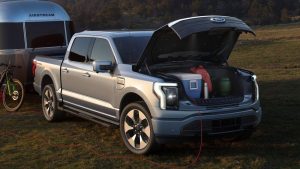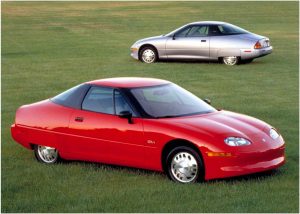Electric vehicles are just the ticket for short trips in between long recharge times.
Assuming you can afford one.
The new electric version of Ford’s F-150, for instance. It can go up to 230 miles on a full charge – a bit less than half as far as the base version of the gas engine’d F-150 can go (in the city; on the highway, where gas-engined vehicles go even farther than electric vehicles, the non-electric F150 can go more than 600 miles).
If you want to go farther in the electric F-150, Ford offers a version of it with up to 320 miles of range – for about $15k more than the just shy of $40k base price of the 230 mile version.
The good news is that each version will come with a real-time range-estimator that takes into account such things as the weather – which greatly affects an EV’s range – as well as the effect of towing or hauling a heavy load in the bed. Also the effect of using the truck’s battery pack to power tools and such.
This way, you’ll know when you’re about to get stuck.
Will people buy it?
A better question might be – how will they afford it?
The electric F-150 isn’t just a lot more expensive; it is becoming more expensive to finance it – as interest rates creep up again, courtesy of another creep – the Biden Thing – who fronts for the things systematically impoverishing the very people who are expected to buy into electric vehicles most of them already couldn’t afford.
Rising interest rates – and rising inflation, which amounts to the same thing – may “kill” the electric car (and truck) far more effectively than GM never did. The latter a reference to the accusation made by some that Government Motors, back in the ‘90s, purposely squashed its EV1 electric car.
Which it didn’t.
The handful made were essentially prototypes; demonstrator models loaned out to people to gauge how such vehicles worked in everyday, real-world driving. GM decided not to produce them – back then – because the government wasn’t yet forcing GM or any other car company to produce them. GM didn’t think enough people to make it worthwhile would spend about $50,000 in today’s money, back then, for an electric car that only went so far and took very long to go at all, again – and pulled the proverbial plug. 
This time, it may be the Great Squeeze which does the same.
Electric vehicles are fundamentally an indulgence, whatever your view of their merits.
They are like having new windows installed in your home. Expensive new windows you don’t actually need right now but which you’d like to have for various reasons. That can be indulged when you’ve got the money – or can afford to finance the money. When you can’t -or can’t afford to – the windows you’ve got will have to do.
Money people point out that the average American took around a $5,000 pay cut this past year – in the form of what they are paid being worth about 15 percent less than what it was worth the prior year, before the ensconsation of the Biden Thing. This is the devaluation of money styled “inflation” by the government, which is the entity (along with the Federal Reserve) responsible for devaluing the buying power of money.
In effect, the real cost of an electric car – or truck – has already gone up by a corollary amount, since the people expected to buy them haven’t got 15 percent more money to buy them with.
The same not-so-hidden cost-rising also applies to cars generally, of course. But it is more visible – or rather, daunting – when it comes to electric cars because of their already very high cost. It is harder for the average person to buy a $20,000 Corolla today than it was a year ago today. But it is even harder for him to buy a $40,000 electric car today.
Financing is the tried-and-true way the car industry has made cars “affordable,” by spreading the purchase price of a car out over six or even more years. But this works only for as long as interest rates are low. When they go up, so does the cost of money – and the monthly payment. A $20k Corolla that might have cost $300 per month to finance when Orange Man Bad costs substantially more than that now that Orange Man Gone – and rising interest rates here.
How about a $40,000 to start electric truck such as the 230 mile version of the F-150? How about the $15k more expensive-than-that version that goes maybe 320 miles? 
Truck buyers – unlike the Fed – cannot print money. And Ford dealers (and the lenders they depend on to finance trucks) can’t give away money, either. Not without losing it, at any rate – and most lenders are inclined not to do that, if they can help it.
Meanwhile, people have less money to spend – on everything – as the spending power of their money wilts like an electric vehicle’s charge.
Will they spend what little they have left on a vehicle that costs them more, to go less far – and which costs them time, too? The better question – again – is how will they be able to?
The very government that is pushing electric cars onto the market is destroying the market’s capacity to absorb them.
It’s going to get interesting, soon.
. . .
Got a question about cars, bikes or anything else? Click on the “ask Eric” link and send ’em in! Or email me at [email protected] if the @!** “ask Eric” button doesn’t work!
If you like what you’ve found here please consider supporting EPautos.
We depend on you to keep the wheels turning!
Our donate button is here.
If you prefer not to use PayPal, our mailing address is:
EPautos
721 Hummingbird Lane SE
Copper Hill, VA 24079
PS: Get an EPautos magnet or sticker or coaster in return for a $20 or more one-time donation or a $10 or more monthly recurring donation. (Please be sure to tell us you want a magnet or sticker or coaster – and also, provide an address, so we know where to mail the thing!)
My eBook about car buying (new and used) is also available for your favorite price – free! Click here. If that fails, email me at [email protected] and I will send you a copy directly!












Rising interest rates – how high can they go? Well we know they can get as high as 20% because the last time inflation was raging in the late 1970’s they did.
https://www.advisorperspectives.com/images/content_image/data/85/85d7fd62f4295ca3724fd5bdca1e0ac9.png
I have an important chart to share with everyone, those of us who study rates have noticed a long term pattern forming on the 10 year Treasury bond chart – an expanding triangle or euphemistically called a “megaphone” pattern:
https://i.imgur.com/t28y9qY.png
Now I posted that chart in my blogs back in 2017 – basically we knew that interest rates were bottoming back then, and the down cycle from 1980 was going to reverse – interest rates would go back up in a very dramatic fashion and probably exceed the highs of 1980. Well rates did bottom in March of 2020, and they did reverse and they are going up since that prediction was made. Furthermore, since the budget deficit and overall debt is soaring far greater than the previous up cycle, we said that rates would go up faster – like a bat out of hell, and that too is unfolding:
https://danericselliottwaves.org/wp-content/uploads/2022/03/3-1.png
The rationalized reason for the rapid rise of rates is the loss of confidence in the Fed and governments. Most national states have no intention and no ability to actually pay back debt in real terms, thus a sudden rise in rates will bankrupt whole nations. Be aware that at this point in history, the market is going to now start pricing risk into bond prices. Who lends to Uncle Sam for 30 years when he might croak in less than 10? In the 1930’s Great Depression – banks, individuals, cities, counties, states did go bankrupt. Yes Virginia – the Federal Government can default, the Federal Government is a corporation and like any corporation it can go into receivership.
The reason for the Keeeeeev fakery. Back door green new deal via exec order.
https://theintercept.com/2022/03/24/biden-defense-production-act-green-energy/
Somebody gonna make big off this one. I guess it’s ok to rape the environment for “green” anythings. Strip mining anybody?
“Will they spend what little they have left on a vehicle that costs them more, to go less far – and which costs them time, too? The better question – again – is how will they be able to?”
And we are still running off calculations made using the prices from the good old days. Want some lithium for that battery of yours?
https://tradingeconomics.com/commodity/lithium
Same story as when they were pushing fuel cells for automobiles until someone ran the numbers and found out there wasn’t enough palladium on the entire earth for the catalyst for that many cars…
‘Rising interest rates – and rising inflation, which amounts to the same thing – may “kill” the electric car (and truck) far more effectively than GM never did.’ — eric
Some fellow travelers:
1. Chronically higher material costs (steel, copper, nickel, palladium, and don’t forget plastic, made from hydrocarbons).
2. Permanently higher wages, owing to unfavorable demographics.
3. Radically escalating electric power rates, not just for fuel (including uranium) but also to cover the capital cost of upgrading the grid.
In the 1930s, many labor-intensive projects and consumer products were possible because prices and wages were depressed, with an endless supply of willing workers.
The 2020s are a mirror image of the 1930s: high prices and labor shortages may kill many ideas that seemed promising during the preceding forty years of falling inflation.
Add in $30 trillion of on-the-books fedgov debt — and over $100 trillion of unfunded fedgov promises — and the fools in charge may even succeed in driving the USA into a ditch.
On the plus side, when the electric goes out you could use the last bit in your EV truck to try and access your bit-coin so you can pay your monthly payment.
This is all proceeding very nicely, if not on schedule, as per the Agenda….
As in Agenda 2030….
Look it up, if not familiar yet with that, lots of details there, no need to bore everyone here with the minor details, depopulation, war, etc….
Stock up!!!
And good luck!!!!
EV’s? Here is a very cool one.
VW ID R sets new record for Goodwood hillclimb, quicker then an F1 car.
Here is a properly engineered electric car plus it is small and light which is good.
https://www.youtube.com/watch?v=vg4z80sr7z0
And it’s only got to carry enough battery to go a mile or two, and not make it home from work.
I would never drive an EV no matter how well it ran or what the range is for the same reason I didn’t get the vax – all the psycho asshats are trying to force us to and their reasons are not benign.
I’d chop my own legs off and crawl everywhere before I considered an EV.
As I always say on threads to the apologists, EV’s would be boutique and niche like those fancy super cars ya never hear of if it weren’t for Uncle forcing it down our throats.
I only hope there’s some glimmer of hope for a course correction in the future and these mandates and stuff are repealed, so we can drive what we want rather than what they want us to
Agree 100%. If TPTB want it, it can’t be that good for me and mine. Just like the vax.
I was talking to someone I know locally. He was telling me that our county’s school board bought an electric school bus to try out. The bus would only go 100 miles on a charge…and then take TWO DAYS to recharge. Back it went!
That’s exactly what I was thinking would happen to these large vehicles they’re trying to electrify like buses and semi’s. Do you know what voltage the system was?
The only way I see these large vehicles working in EV is with very high voltage charges like 800+ volts, maybe even 1160 which is a common line voltage and is probably possible to get in industrial areas.
Nunzio,
Electric buses can work, but their charging has to be done differently. In the video below, ABB came up with an electric city bus back in 2013, and it worked well. They had quick charges at every 3-4 stops, which they called flash charging. They did medium charge at both termini at the beginning and end of the route; this was done for a few minutes. Finally, they did an overnight charge. But yeah, electric buses without overhead lines can work. See what ABB did back in 2013 here: https://www.youtube.com/watch?v=c-Fg94A2Vko
I’ll bet that the range of the truck is much less when it is fully loaded. Who would buy a truck (or any vehicle) that takes 8 to 12 hours to charge for 100 miles of range? I sure as hell wouldn’t. If I have to, I will make producer gas to keep my ICE vehicles running.
Certainly a lot of people that buy/own trucks are for doing truck things. And certainly range is going to be a fraction of stated range empty. You will be seeing lots of unhappy customers when they try towing their boat, trailer, etc…
Most of the real initial purchases of the F150 Lightning are not going to be made by people intent on doing a lot of hauling with the vehicle. The buyers will be Show Ya types who (a) feel the need to prove to friends and family that an electric truck-shaped vehicle, a vaunted F150 no less, is possible no matter how limited they are in terms of practicality and (b) want to be that guy in the commercials powering his house in the middle of a neighborhood blackout — even if the lights only stay on for 10 minutes, he still had lights.
Show Ya.
My brother is a Show Ya type. He probably reserved his F150 Lightning as soon as the web site was open.
A “new and improved” crop of goat roper cowboy wannabes? All having a need to compensate for, shall we say, other “short” comings?
I believe the market will decide the viability of EV’s. I can afford one but have no interest in purchasing one due to the shortcomings. I’m retired so do not have to drive back and forth to work, which it seems to me is the best option fot using one, if you drive less than the capacity of the battery both ways. Another wild card is the cost of electricity, I’m old enough to remember an electric bill coming every two months and being 15-20 dollars plus getting light bulbs if they were needed, now electric bills without charging a vehicle can run up to 500 a month. Too many negatives to make them viable in my opinion.
EV range
How are they calculating that 230 mile range? Is it based on theoretically using the full capacity of the battery? You can only use 60% of the battery capacity, between 20% and 80% charge, most of the time. So the real range is 60% of 230 miles? probably. 60% of 230 = 138 miles.
You can’t use the last bottom 20% because it damages the battery, you can’t use the top 20% in reality because the last 20% between 80% and 100% has to be charged very slowly or it damages the battery, if you are recharging on the road it will take far too long to charge that last 20% from 80% to 100% charge.
If it is very cold out you can subtract another 50% of the range, if you use the heater and windshield wipers, rear defroster you lose even more range. 60% of 230 = 138 miles, then minus another 50% because it is really cold? 50% of 138 = 69 miles.
If you drive the EV really hard/fast it uses a lot of energy, a tesla driven 10 tenths on the track used 80 miles of range in 8 miles, you better drive really slow.
In an ice car you can use more then 60% of the gas in the gas tank and the heat is free, it doesn’t require more energy to keep warm.
In damp climates you have to drive the car and use the heater to get the condensation out of the car, if people use their electric heater less in their EV because of loss of range the car won’t be dried out properly, this is very bad for electrical connections, with dampness they corrode and lose their connection, then nothing works.
My Tesla neighbor complains all the time about the windshield defrosters not working. She says it’s really a problem (we live in a valley which makes the problem a little worse). So I keep telling her that the AC compressor has to be on for it to work and the car defaults to no-AC compressor on when you select defroster, obviously to save E-juice. So she is finally figuring it out that she has to turn the AC compressor on manually (button) every time she wants defrost.
She’s done with the car and it’s fancy gadgets that she was intrigued by.
I actually prefer that set up, where you have to turn on the AC all by yourself, instead of automatically coming on with the defrost setting. I know, it’s hard. There are times when ice and snow are accumulating on the windshield so fast you need all the heat you can get there, no air conditioning wanted.
Actually the A/C helps defrost the windshield faster as moisture is removed by the A/C. Yes, even when the setting is on HEAT, the A/C does help, even on the inside which tends to “fog up”.
removing the moisture (fog) with AC is required where we live (high relative humidity). Heat alone doesn’t do it.
Re: EV truck range
So if drive that EV truck with a full load and towing and or drive it 10 tenths in really cold weather with the heater, defroster and wipers going the range is 40 to 60 miles?
EV truck range
So if drive that EV truck with a full load and towing or drive it 10 tenths in really cold weather with the heater, defroster and wipers going the range is 40 to 60 miles? hahaha. Lawsuits coming?
Then there are mountains. Imagine driving an EV Semi Triple Bottom through the Rockies on I-90 from Coeur D’Alene, Idaho to Seattle, WA in January.
I would be willing to bet that a lot of reservations for the F150 Lightning are for flippers intent on never driving the vehicles. $100 for the reservation was not a difficult amount of money for the average person to find left over in their bank accounts monthly over the last two years, between stimulus checks and eviction moratoriums, but actually buying/financing the vehicle will be a much tougher proposition for a lot of households.
Welcome to the Playstation 5 economy.
Also, I’ve never believed the $40,000 base price for a second from Ford/Tesla. Even if that were possible, the dealers will shun the base model F150 Lightning similar to what they do with the $20,000 Maverick base model.
I think most of the sales of electric trucks will be fleet sales to schools, municipalities and government agencies. The cost will be borne by the taxpayers.
When ya can’t dazzle ’em with brilliance, baffle ’em with bullshit. From energy.gov:
“Electric vehicles (EVs) have the potential to significantly improve federal fleet efficiency and reduce vehicle operation and maintenance costs. At the same time, EVs provide agencies a simple solution to satisfy key statutory requirements for acquiring alternative fuel vehicles and low greenhouse-gas emitting vehicles.”
Still waiting to see a battery powered tank, maybe the DOD can send some to Ukraine 😆
Who needs partisans with Molotov cocktails when your tank can burn itself…
Though I saw hybrid military trucks 15 years ago at trade shows, and they actually looked interesting for a couple reasons.
You are correct. They will park them and save a bundle. If they use them they will still be parking them just at inopportune times. Haha. Keep your ICE vehicles. Repair forever.
Well considering that the U.S. Army is accelerating its effort to operate an all-electric non-tactical vehicle fleet by 2035 that may well be true.But like that old comic picture; the line for “Work hard, Keep half” is a lot sorter than the one that says “Free Stuff & Welfare”. So how will they pay for this then? Funny thing is what happens when your EV truck catches fire and takes out your ammo dump?
The military will not use EV’s if they do then we know it’s Morons in charge. The Evil ones actually trying to run things know they need their Mercenaries.
Good point X. Probably force them to somehow. Thanks
One my buddy’s that worked for Ford told his wife when they bought a new van; “Buy what you want because you’ll be driving it for the next 10 years”. And they did, but could you even get 10 years of reliable service from an EV? Heck, I’m still driving the same hot rod I bought in high scruel, and even my summer daily driver is from the 90s. As vehicle costs skyrocket the only way that you will be able to afford them is if you own them longer. If looking at long term ownership a ICE Corolla would be a better choice than a Tesla. But if their goal is have you take the bus everywhere and live in a 300 square foot apartment and expect no better why would you even strive to get ahead? One works harder to get a perceived luxury than a bowl of crickets and a cot in the homeless shelter.
Amen, Landru –
A Corolla – or for that matter, any other non-electric car – can save you a lot of money by owning it longer. Especially once it’s paid-for. Which is a lot easier to do when a car costs $20k rather than $40k. And which car is more likely to last longer? The $40k EV? Or the $20k Corolla?
The question answers itself.
All of this begs the question, too. What is the object of making vehicles cost more by electrifying them? The answer need not be elaborated.
Eric; readers of your column don’t need this elaborated for them, but most people who acquire all their information from the MSM probably haven’t figured this out yet. The free thinkers of the world are pulling their hair out over what they see coming. I just wish the MSM would warn people but then they wouldn’t be the MSM. If the MSM had done a documentary on Noah it would have branded him as an insane prepper, having livestock in a residential area and harassed him over constructing an ocean going going vessel without permits.
Very true, Landru –
This site and my writing is for both internal and external consumption; I get asked to do radio stuff fairly often based on what gets seen here and I think that helps get the “word” out to people who may not have any idea this site exists. And – who knows? – maybe one day, heretical sites such as this will be “mainstream”!
I hope not. I prefer to look forward to a time when there is no mainstream. Where people look for information all by themselves. Where the instant someone claims to be the authoritative source, they are castigated and vilified.
Eric, I’d be happy to put up a banner advertising your site at our local “coffee & classics” meet-up here in Grass Valley (Calif), which runs every Saturday morning, weather permitting. Dozens of great cars from the 50s, 60s and 70s … and no EVs. It’s a great bunch of gear-heads and fossil fuel lovers. I suspect they’d all love and appreciate this site.
Thank you, Mr. Bill – that would be mighty kind of you!
Now if only I could get a Perpetual Coffee Machine…
In direct opposition to “warning” people, they assist in inflicting the exact thing they should be warning us about.
Landru,
Who got drunk and passed out naked in the front yard…
New theory:
Noah was a redneck.
At age 60, three years back, an old pension from previous (30 years ago) job came good. The cash payout enabled me to buy a brand new Dacia, I’ve told before.
This is a simple Romanian built car based on the Renault Clio circa 2000 something, old tech now.
This will be my car until the wheels fall off, which are steel cause alloys corrode and you have to put air in every other day! Not having to check them every day is like winning the lottery.
I will never finance a vehicle, it’s cash or I take the bus, which is free in soviet Scotland if yer an auld fart like mysell.
But petrol is getting high, just like everywhere, though we’ve paid far more for decades than other places so it doesn’t hurt as much psychologically as it might.